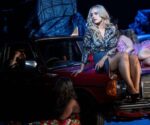Rossini’s Cinderella full of surprises at the ENO | Theatre | Entertainment
When Rossini and his librettist Jacopo Ferretti turned Cinderella into an opera (at very short notice, incidentally) in 1817, they had to modify several aspects of the story to make the staging plausible. Gone are the pumpkin-coach, the rat-coachman, and the glass slipper, which becomes a silver bracelet, and the evil step-mother is turned into a wicked step-father. Even the mice that turn into horses are banished, though Julia Burbach, directing the production, brings the mice back, scampering through several scenes, though they contribute nothing to the plot.
With a chorus of English monarchs who have stepped down from paintings, and several other extraneous characters adding to the confusion, Burbach’s production is generally rather too busy, often distracting from the main story and resulting in too many people singing at the same time, making the words difficult to hear.
This last drawback is increased by Christopher Cowell’s translation, which shows the difficulty of translating Italian opera into English. Italian is a beautiful language for singing, containing many long, soft vowels, while English labours under cumbersome clusters of consonants. Cowell’s translation includes many delightful rhymes and original jokes, but often these were almost unsingable and I found my gaze too often fixed on the surtitles when I would rather have been watching the performance.
This may have been a sign of insufficient rehearsal time, but a clunkiness in the language and a tendency of the singers to gabble their way through the lines in order to keep up with the music also played a large part. Charles Rice, as the Prince’s servant Dandini, particularly suffered from this as he had several of Rossini’s gloriously fast patter songs to negotiate his way through.
While the conductor, Yi-Chen Lin, demonstrated her true flair for Rossini’s music, managing to hold the orchestra and singers together through even the most difficult passages, the balance between players and singers occasionally left the orchestra too loud, adding to the difficult in hearing what was going on. The ENO has always followed a policy of singing operas in English, but if one cannot hear the words, it would surely be better to revert to Italian.
Fortunately, the two main characters, American soprano Deepa Johnny as Cinderella, and British tenor Aaron Godfrey-Mayes as Prince Don Ramiro, both overcame these problems. Deepa Johnny was particularly impressive, with a gloriously powerful yet tender voice, and superb technique in performing all the vocal pyrotechnics Rossini could throw at her, particularly in her final, joyous aria.
Despite its flaws, Rossini’s music will surely make this the best Autumn pantomime in town.








